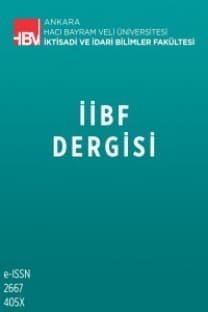Türkiye’nin Çok Partili Siyasal Sisteme Geçiş Sürecinde Milli İrade Söylemi ve 1946 Genel Seçimleri
Çok partili siyasal sisteme geçiş sürecinde 1946 genel seçimleri, Türk siyasal yaşamındaki önemli eşiklerden biri olmuştur. İlk kez “tek dereceli” ve “çok partili” olarak yapılan 1946 seçimleri öncesinin incelenmesi siyasal yaşama dair önemli noktalar içermektedir. Seçime giden süreçte dönemin en etkin figürü Cumhurbaşkanı İsmet İnönü’nün çıktığı yurt gezilerinde, yaptığı konuşmalarda, verdiği demeçlerde ve gazetelere yansıyan yazılarda kuvvetli bir sandığa gitme çağrısı hakim olmuştur. Vatandaşa bir “seçmen” olduğunu hatırlatan, “demokrasi”ye, “milli irade”ye giden yolun “sandık”tan geçtiğini, oy vermenin “milli bir görev, kutsal bir borç” olduğunu vurgulayan bu çağrılarda “milli irade”, “seçim” ve “oy çokluğu” birlikteliğine olan vurgu güçlüdür. Vatandaş seçmen olarak büyük bir önem kazanırken, milli irade Meclis ile demokrasi sandık ile özdeşleştirilmiştir. Yapılan bu çalışmada, 1946 genel seçimleri öncesi İsmet İnönü, CHP yöneticileri ve basın tarafından vatandaşlara yapılan seçimlere katılım çağrısının ve bu yöndeki propagandanın “milli irade” söylemiyle ilişkisi ele alınacaktır. Seçim çağrılarına ve seçim sonrası zafer konuşmalarına yansıyan, Türk siyasal yaşamının baskın bir tonu olan “milli irade” söyleminin ilk izlerine işaret edilecektir. Çalışmada, 1946 seçimleri öncesinde başta İsmet İnönü’nün seçim öncesi demeçleri olmak üzere dönemin gazeteleri (Ulus, Akşam, Vakit, Cumhuriyet) taranarak analiz edilmiştir.
Anahtar Kelimeler:
1946 Genel Seçimleri, milli irade söylemi, sandık, çoğunlukçu demokrasi, Cumhuriyet Halk Partisi
The Discourse of National Will During Turkey’s Transition to a Multi-Party Political System and the 1946 General Elections
The 1946 general elections constituted a significant threshold in the Turkish politics during the transition to a multi-party political system. The 1946 elections were the first “direct” and “multi-party” elections held in Turkey, the analysis of the pre-election period of which, thus, involves significant aspects about the political life. President Ismet Inönü was the most influential figure in the period until the elections, and a strong call for voting dominated his nationwide campaign tour speeches and his statements as well as newspaper articles. These calls reminded the citizens their role as “voters” and highlighted that the “ballot box” paved the way for “democracy” and “national will” and that voting was “a national and sacred duty” with a strong emphasis on the unison of “national will”, “elections” and “majority vote”. Citizens gained great importance as voters, and national will was identified with the Parliament whereas democracy was identified with the ballot box. This study handles the relationship between the discourse of “national will” and the call on the citizens to vote and the propaganda in this regard by Ismet Inönü, the CHP executives and the press before the 1946 general elections. This study points to the first traces of the discourse of “national will” that has been a dominating tone in the Turkish political life, as reflected in the call for voting and the post-election victory speeches. In this study, the newspapers of the respective period (Ulus, Akşam, Vakit, Cumhuriyet) were searched and analyzed primarily with regard to the pre-election speeches of President İsmet İnönü in the period before the 1946 elections.
Keywords:
1946 general elections, National will discourse, ballot box, majoritarian democracy, Republican People's Party,
___
- “Adam sende! Benim bir reyimden ne çıkar? demeyelim. Halk iradesi, tek tek reylerin bir araya gelmesinden doğar”. Vakit. 17 Mayıs 1946.
- Ahmad, Feroz. Demokrasi Sürecinde Türkiye. çev., Ahmet Fethi. İstanbul: Hil Yayınları, 1992.
- Ahmad, Feroz. Modern Türkiye’nin Oluşumu. çev., Yavuz Alogan. Ankara: Kaynak Yayınları, 2017.
- Arslan, Zühtü. “Rousseau’nun Hayaletleri: Yeni Devlet Eski Söylem”. Doğu Batı. Sayı: 21. 2003. s. 11-29.
- Ateş, A. Emre ve Gökçeler Onur. “12 Temmuz Beyannamesinin Gölgesinde Cumhurbaşkanı İsmet İnönü’nün Yurt Gezileri”. İnsan ve İnsan Dergisi. 6(21), 2019. s. 477-492.
- Yayın Aralığı: Yılda 3 Sayı
- Başlangıç: 1999
- Yayıncı: Ankara Hacı Bayram Veli Üniversitesi
Sayıdaki Diğer Makaleler
Berkay KURDOĞLU, İbrahim ŞAHİN
AB Üyeliği Sonrası Çekya ve Değişen Siyasal Dinamikler
Türkiye’de Yaşam Memnuniyeti Düzeyleri: Veri Madenciliği Teknikleri ile Bir Uygulama
Mehmet Çağlar ÜNSAL, Şenol ALTAN
İkiz Açık Hipotezi Türkiye’de Geçerliliği: Zamanla Değişen Nedensellik Analizi
İklim Politikası Belirsizliği CO2 emisyonunu etkiler mi? ABD'den Ampirik Kanıtlar
Kent ve Kalkınma İlişkisinde Filyos Örneği
Enerji Verimliliği Endeksinin Ekonomik Faaliyet Üzerindeki Etkileri: G7 Ülkeleri Örneği
Muhammed Şehid GÖRÜŞ, Önder ÖZGÜR
Nurullah BERBEROĞLU, Sezer KORKMAZ
Emre Esat TOPALOĞLU, Çiğdem KURT CİHANGİR
Türkiye’nin Çok Partili Siyasal Sisteme Geçiş Sürecinde Milli İrade Söylemi ve 1946 Genel Seçimleri
